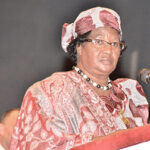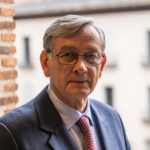Danilo Türk – Discussing Human Rights and Duties
“The world is better than in 1948, but it is not better for everybody”, said Member of World Leadership Alliance-Club de Madrid, Danilo Türk, on the Convention of Human Rights. For the former President of Slovenia, Human Rights are a “standard of achievement”, something which was clear for the authors of the Convention. They understood that implementation would not happen fast.
The Member of WLA-CdM recalled that, historically, international law has greatly developed, which has contributed to the definition of Human Rights.
“The question now is what can we do to implement Human Rights and make real change”, said Danilo Türk, who proposed to bring about this change with a social and international global order. Nevertheless, interpretations of these principles vary from country to country, contributing to different ways of implementing Human Rights.
The former President of Slovenia added during his intervention that implementation depends on cooperation among major powers in fora like the UN. When this cooperation is lacking, “things cannot be done”. UN Secretary-General, António Guterres, who is also a Member of WLA-CdM, is tirelessly working to bring about a truce in the war of Yemen. It is precisely a lack of cooperation between major powers that trumps his efforts.
“This fundamental problem”, says Danilo Türk in regards to the lack of cooperation in the UN, “has an impact on Human Rights”.
Watch Danilo Türk’s intervention by clicking below
Aminata Touré- Back To Basics: Democracy and the Fight Against Corruption
Member Aminata Touré started her speech reminding audiences that “illegal financial activity represents between two and five per cent of the world’s GDP” and is present in all countries in the world. “Corruption is far from being specific to Africa, although it persists in the continent”, said the Member of WLA-CdM mentioning Bernie Madoff, as a Western “world champion” of corruption.
Large scale corruption frequently involves an international dimension and thus international action is necessary to combat it, noted the former President of Senegal, adding that corruption “delays and undermines” development in Africa.
The former Prime Minister of Senegal recalled the time when she ran for a municipality with a commitment to fight corruption and electors did not understand it, while in so many countries corrupt politicians “remain very popular and get re-elected time and time again”. Pablo Escobar could be an extreme example of this.
“We tend to forget the cultural and social dimension of corruption. To fight corruption effectively, we need to have a 360-degree approach“, said Touré. At the international level, frameworks to fight corruption have become more solid over time.
Touré mentioned the UN Convention against corruption and celebrated that numerous states implement measures despite their limited effectiveness in front of the “complex schemes, like tax havens and window dressing”, which still prevail.
“We need to work together. We need to exchange information. But we need to raise awareness widely because we are facing very powerful and well-organized forces”, said Touré right after reminding the audience that the main beneficiary of corruption is never the people.
Watch Aminata Touré’s intervention by clicking below
Joyce Banda- The Human Responsibility to Change the World
The former President of Malawi, Joyce Banda, believes that to start changing the world, one must start by empowering women. “If you leave half of the population behind, it is like trying to walk with one leg. You won’t make it far”, said the Member of WLA-CdM.
Banda stated that the economic empowerment of women is her “mission in life” because she finds it key for the social and political empowerment of society in general. The former President of Malawi referenced studies that point to a correlation between countries with female leaders and a rise in GDP and better policies in education, health, indicating that it is worth to support female leaders.
Joyce Banda reminded the audience that bleeding after labour is a leading cause of death for women in Africa and Malawi. In the Western world, instead, “it is a cause of celebration”.
“Getting pregnant should not be a life sentence”, said the former President of Malawi, who considers herself fortunate to have been able to do something about it. When Joyce Banda became President of Malawi in 2012, her administration reduced maternal mortality by 30% in two years.
She achieved this impressive change by involving chiefs, who passed on the health recommendations to their communities. “We in Africa know what needs to be done. Our better results are when we partner: Our friends from the West and ourselves“, she added.
The Member of WLA-CdM believes that creating smart partnerships is key to tackling Africa’s problems, said Joyce Banda at Estoril Conferences.
To conclude her speech, Joyce Banda quoted research from her book From Day One: Why Supporting Girls Aged 0 to 10 Is Critical to Change Africa’s Path, which claims that leaders build 70% of their leadership traits in society through education and experience.
“It is my hope that decision-makers will implement policies that protect girls, and facilitate women leaders that partner with our friends of the West”, ended the former President of Malawi.
Watch Joyce Banda’s intervention by clicking below



